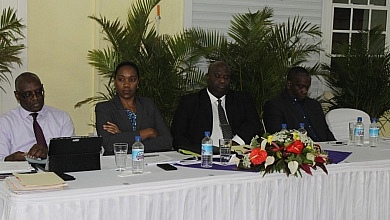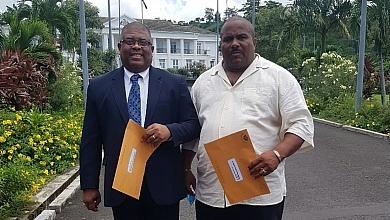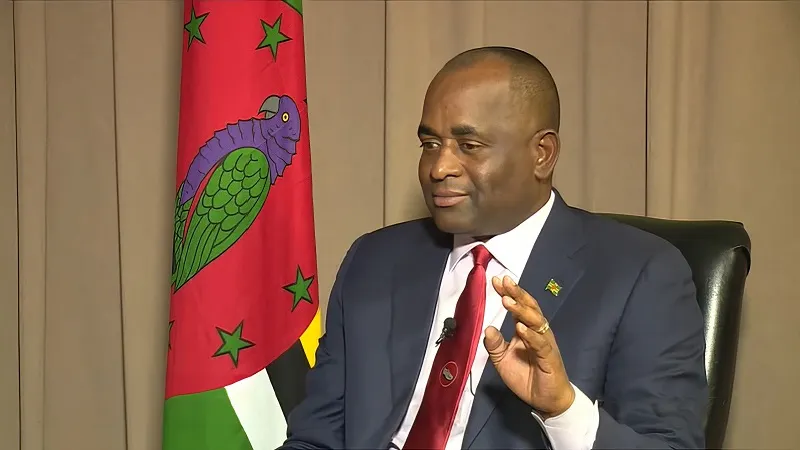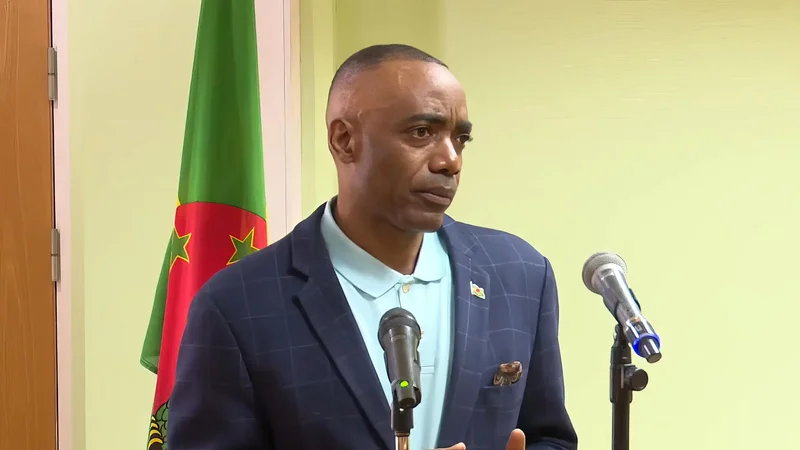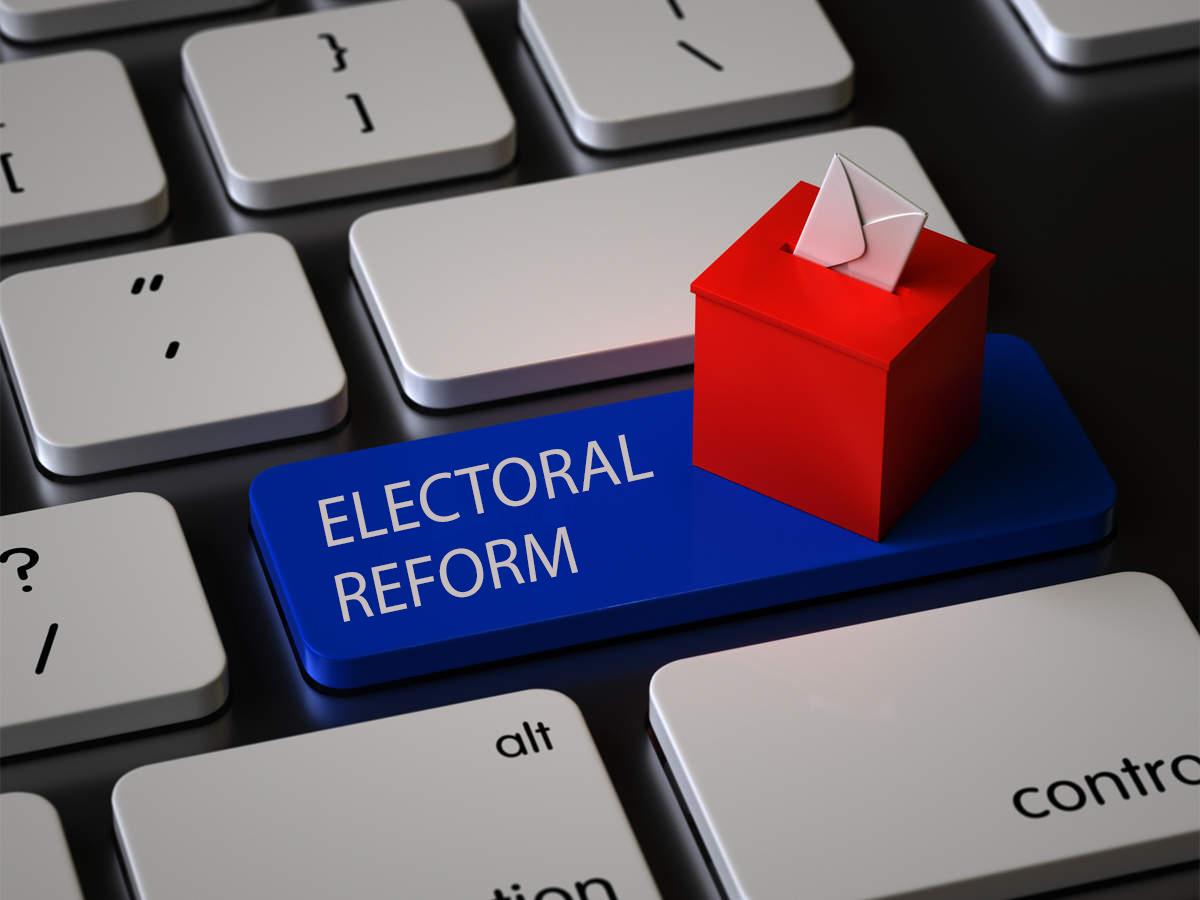
The Group of Church, Business, Trade Unions and Civil Society leaders, comprising representatives from the Dominica Christian Council (DCC), The Dominica Business Forum Inc. (DBF Inc.), The Water Front and Allied Workers Union (WAWU), The Dominica Bar Association (DBA), The Dominica Association Evangelical Churches (DAEC), and The Dominica Public Service Union (DPSU), commenced its work on Wednesday 31st January 2019 with the objective of “finding ways for Dominica to achieve the necessary electoral reform before the next general election”. The Group, which has been facilitating efforts towards electoral reform in the Commonwealth of Dominica, submitted its Final Report to stakeholders and the general public on 8th August 2019.
As if to continue, complement and amplify the efforts began by the Group, and as it were, to urge the Group’s work to completion, emanating from a request made by the Government of the Commonwealth of Dominica jointly to the CARICOM Secretariat (CARICOM), the Commonwealth Secretariat (COMSEC), and the General Secretariat of the Organization of American States (GS/OAS), an eight (8) person Special Joint Mission of the Organisation of the American States, the Commonwealth and CARICOM conducted a situational review of matters concerning electoral reform in Dominica at hearings from 6th to 9th August 2019.
The report of the Special Joint Mission of 17th September 2019, submitted to the Government of the Commonwealth of Dominica, was made public on or about the 26th September 2019.
The Group lauds the Special Joint Mission for its presentation and reinforcement of workable recommendations towards achieving realistic electoral reform in advance of the upcoming general elections. The Group endorses these recommendations which are in one way or the other validations of the Group’s own recommendation in its Final Report.
Importantly, the Special Joint Mission in its report points out and reminds us:
- Electoral reform should ideally be a continuous process, rather than be viewed as an event.
- No aspect of electoral frameworks, systems, institutions, planning, management or operations, however, well it may have functioned in the past, should be regarded as sacrosanct from reform or modernization. Past performance is not necessarily a reliable guide to future performance.
- Electoral Management Bodies (EMBs), and therefore our own local Electoral Commission], have vital roles to play as advocates of electoral reforms in general, as implementers of institutional reforms, and as initiators and implementers of administrative reforms, including technical and procedural reforms.
- Political will and political consensus among key stakeholders is vital for successful implementation of electoral reform.
The Special Joint Mission’s recommendations are underpinned by those important best practice norms. Hence, its recommendation to obtain data for issuing voter ID cards and commence the work of sanitising the electoral lists is via a House to House Re-verification of Electors which itself will set the groundwork for the Constituency Boundaries Commission to undertake its own future reforms to adhere to the constitutional stipulation that “all constituencies shall contain as nearly equal numbers of inhabitants as appears to the Constituency Boundaries Commission to be reasonably practicable. For the December 2014 Parliamentary Elections, the size of constituencies ranged from a low 1564 electors to a high 7446, further highlighting the need for review of existing electoral boundaries.”
The Special Joint Missions notes, as the Group has said before, that “The three areas identified for reform, even though viewed separately, are interconnected. The completion of the re-verification exercise is a necessary undertaking which must precede the production and issuing of identification cards.”
In summary the Joint Special Mission’s recommendations are:
Updating the Voters’ Lists
- Conduct a house-to-house re-verification exercise across the entire Island. It is recommended that serious consideration also be given to increasing the number of full-time employees at the Electoral Office.
- Each resident found should be re-verified in their current polling district, except for those for whom provisions were made due to the displacement caused by the recent storms.
- Persons who are confirmed to be deceased (via death certificates, funeral programmes, obituaries in newspapers) should be removed from the list.
- A list of electors not found should be publicized (including in the local newspapers) requesting they visit the nearest Registration Centre to complete the verification process. Those electors not found and who fail to come forward after publication of the “Electors Not Found List” should remain on the Voters’ List unless and until they are removed under the provisions included in Section 7 of the Registration of Electors Act.
- The necessary technical and administrative expertise should be provided to the Electoral Commission and the Electoral Office in support of these efforts.
The Issuing of Identification Cards
The Joint Mission notes the difference in opinion as to whether new legislation is required to facilitate the production and issuance of photo identification cards. In keeping with what has been done in other jurisdictions, it is recommended that the legislation be amended to broaden the authority of the Electoral Commission to collect and use electors’ biometric data and thereafter to issue photo identification card. In this regard:
- The photograph and other biometric data (as determined) of each elector verified on the Island, should be taken and cross-matched to remove duplicate registrations.
- The Electoral Commission should take a decision on how it will distribute ID cards. Uncollected or undistributed cards should be available for collection on Election Day at specially established points at each polling station.
- Electors currently residing on the Island, who are not re-verified, and whose names remain on the list should be asked to take along some other form of identification on Election Day.
Voting by the Diaspora
- The Joint Mission recommends that concurrent with the re-verification exercise, the Electoral Office should seek to engage the Immigration Department to identify the electors on the current list who are resident overseas.
- Those found to be in violation of the five-year limit, according to Section 7 of the Registration of Electors Act, and who are therefore no longer eligible to be on the list should be removed. In cases where the information cannot be verified, such electors should be allowed to remain on the list to prevent the disenfranchising of a valid elector.
- All electors coming in from the Diaspora to vote should be asked to provide a valid passport as identification, in order to exercise his or her franchise.
- The Joint Mission recommends that urgent and inclusive consultations be conducted on the process of the overseas verification of electors in order to settle and inform the Commission’s actions in this regard.
The Group endorses these recommendations which are in one way or the other validations of the Group’s own recommendation in its Final Report. These validations give clarity to, and even confirm, the true intent of the patriotic initiative undertaken by the Group who, concerned about the possibility of going into another general election without the necessary reform as recommended by the OAS and Commonwealth observers of the last general election and the possible repercussions that may ensue if the next elections are perceived to be delegitimized, spent the last few months in this effort.
We believe that the public would be short-changed if the Special Joint Mission’s recommendations are not implemented. The Group recognizes the authority of the Electoral Commission in ensuring a free and fair electoral process and appeals to all stakeholders, including political parties and the general public, to assist in whatever way possible to facilitate the process.
In this light, the Group strongly urges the Electoral Commission to commence the immediate implementation of the Special Joint Mission’s recommendation, indicating to the Executive Branch of Government any additional resources necessary to implement these recommendations.
Given the pronouncement of the Electoral Commission of it having obtained the required resources for its verification exercise that was supposed to have commenced on July 2018, (and deemed adequate for the implementation of the confirmation exercises and issuing of ID cards of proposed under the Registration of Electors (Amendment) Bill 2018), only an increase in manpower may be necessary. The Group has previously calculated that a 200 person team can conduct the verification exercise and collection of data for ID’s in less than 8 weeks.
The Group has previously recommended that the Electoral Commission can amend legislation by regulations to enable it to issue ID cards with the biometric data it considers necessary. Notwithstanding this recommendation, the Group has also recommended, if the spirit of compromise within the leading political parties exists, that Parliament is presented for enactment a simplified, focused and appropriate amendment that will adequately empower the Chief Elections Officer to issue, and require to be used in any election, the necessary voter identification cards.
The Group therefore calls on the Electoral Commission and the Executive Branch of Government, led by the Hon Attorney General, to draft with much dispatch this necessary legislation. Failing urgent action by the political leaders and parliament, and even out of an abundance of caution, the Group recommends that the Electoral Commission immediately proceeds with the required amendment of legislation by regulation.
The Group underscores the plea of the Special Joint Mission: “The Joint Mission strongly encourages the Leaders of the two main political parties to engage in earnest, meaningful and constructive one-to-one dialogue on the issue of electoral reform. All three organizations – CARICOM, the Commonwealth and the OAS – are agreeable to facilitating such an endeavour should this recommendation be welcomed by the political leaders.”
If these fail, the Group believes that all other efforts should be made to ensure that this coming election is not held without the reform and therefore to do all to prevent civil disturbances or unrest stemming ultimately from the failure to undertake the required reform. In this light, the Group strongly recommends that the machinery be set up urgently to consider and undertake legal avenues, as happened in Guyana, to ensure timely necessary reform before the next general elections. Our country cannot afford civil unrest in the wake of a general election.
In summary, we call on;
- The Electoral Commission to move urgently to implement the recommendations of the Special Joint Mission in its entirety as far as practical, including making the appropriate regulations to enable its work.
- The Government to provide all and any additional financial and other resources necessary, in order to enable the Electoral Commission to complete the necessary reform activities before the next general elections.
- The Office of the Attorney General and the Electoral Commission to work on the bill necessary for presentation to Parliament for the enactment of a simplified, focused and appropriate amendment that will adequately empower the Chief Elections Officer to issue, and require to be used in any election, the necessary voter identification cards.
- The Leaders of the political parties to engage in earnest meaningful and constructive one-to-one dialogue on the issue of electoral reform, and to cease all their parties’ interference in the work of the Electoral Commission.
- Political Parties, and other concerned citizens or bodies, to consider court action to guide the process of reform, if all else fails, in order to ensure that the Electoral Commission undertakes the timely necessary reform before the next general elections.
- Every and all citizens to renew their commitment to collaborate in resolving Dominica’s electoral challenges, to pray and work for peace, and do all in our own locality and influence to avert the occurrence of civil disturbances in the wake of a general election. Our country deserves our peaceful collaborative effort at rebuilding; let peace flow from our work for a just society and systems of governance!
The Group continues to be grateful and indebted to the people of Dominica for your support of our work, and pledges to remain in the service of the Commonwealth of Dominica.
This article is copyright © 2019 DOM767





